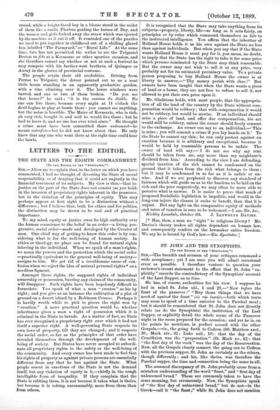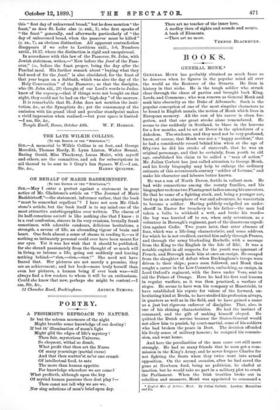ST. JOHN AND THE SYNOPTISTS.
[To TEE EDITOR OF THE 'SPECTATOR." I
SIR,—The breadth and acumen of your critiques command a wide acceptance ; yet I am sure you will admit occasional error as possible. I therefore venture to question your reviewer's recent statement to the effect that St. John " ex- plicitly " records the contradictory of the Synoptists' account, of the Last Supper, as to time.
He has, of course, authorities for his view. I suppose he had in mind St. John rill., 1 and 29,—" Now before the of the passover :" "Buy those things that we have
need of against the feast" (tic lopTiy),—both which texts. may seem to speak of a time anterior to the Paschal meal;. but it should be remembered that St. John does not directly relate (as do the Synoptists) the institution of the Last Supper, or explicitly detail the whole scene of the Passover night in the room prepared for the occasion; and yet he is, on the points he mentions, in perfect accord with the other Gospels,—viz., the going forth to Cedron (SS. Matthew mi., 36; Mark xiv., 32; Luke sail., 19) : that the day of the Crucifixion was the " preparation " (St. Mark x v., 42) : that "the first day of the week" was the day of the Resurrection. Now, all the Gospels clearly connect the going out to Cedron with the previous supper, St. John as certainly as the others,. though differently ; and his, like theirs, was therefore the. Paschal supper, the time and connection being the same in all..
The assumed discrepancy of St. John probably arose from a mistaken understanding of the word "feast," and "first day of unleavened bread." These are commonly taken to have the same meaning, but erroneously. Now, the Synoptists speak of "the first day of unleavened bread," but do not—in the Greek--call' it "the feast;" while St. John does not mention this "first day of unleavened bread," but he does mention "the feast," as does St. Luke also (c. mil., 1), who first speaks of -" the feast" generally, and afterwards particularly of "the day of unleavened bread, when the passover must be killed" xx., 7), an obvious distinction. All apparent contradiction disappears if we refer to Leviticus xxiii., 5-6, Numbers 16-17, where the distinction is rigid and unequivocal.
In accordance with this law of the Passover, St. John, with Jewish strictness, writes,—" Now before the feast of the Pass- over," i.e., before the feast proper, being the day after the Paschal meal. His further remark about "buying what they had need of for the feast," is also elucidated, for the feast of that year began on a Sabbath, which was also the day of the
Holy Convocation" of the Passover; so that the disciples, who (St. John xiii., 29) thought of our Lord's words to Judas, knew of the urgency,—that if things were not bought on that night, they could not be had on the" high-day" of the morrow.
It is remarkable that St. John does not mention the insti- tution, &c., as the Synoptists do ; yet the consonancy of the -omission with his grand ideal and peculiar standpoint makes .a vivid impression when realised :—but your space is limited. —I am, Sir, &c., Temple Ewell, Dover, October 10th. W. F. HOBSON.



















































 Previous page
Previous page